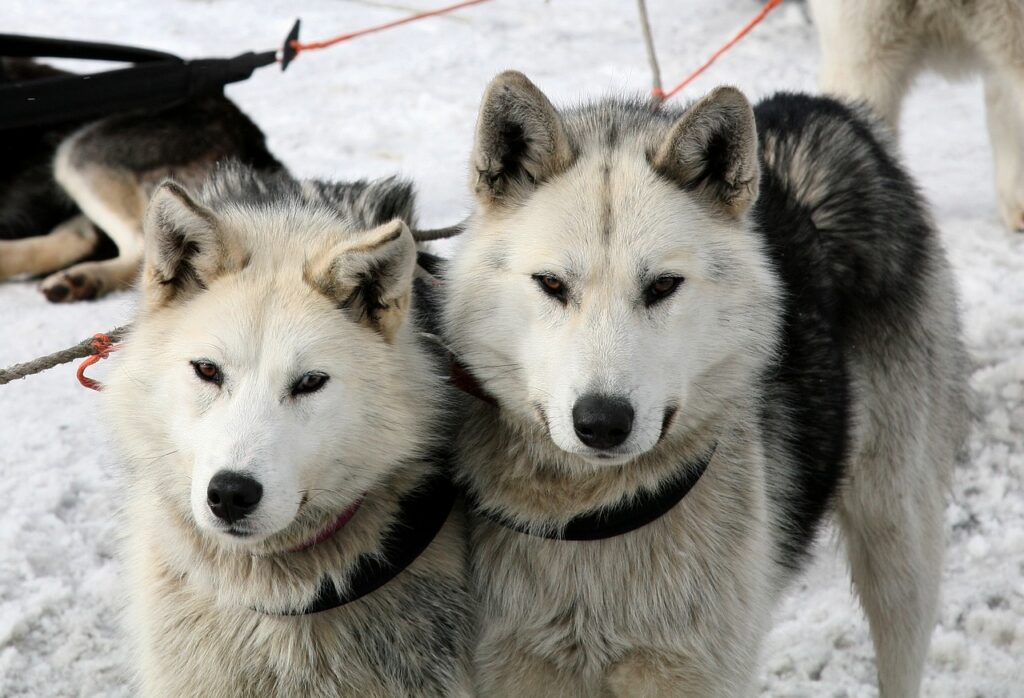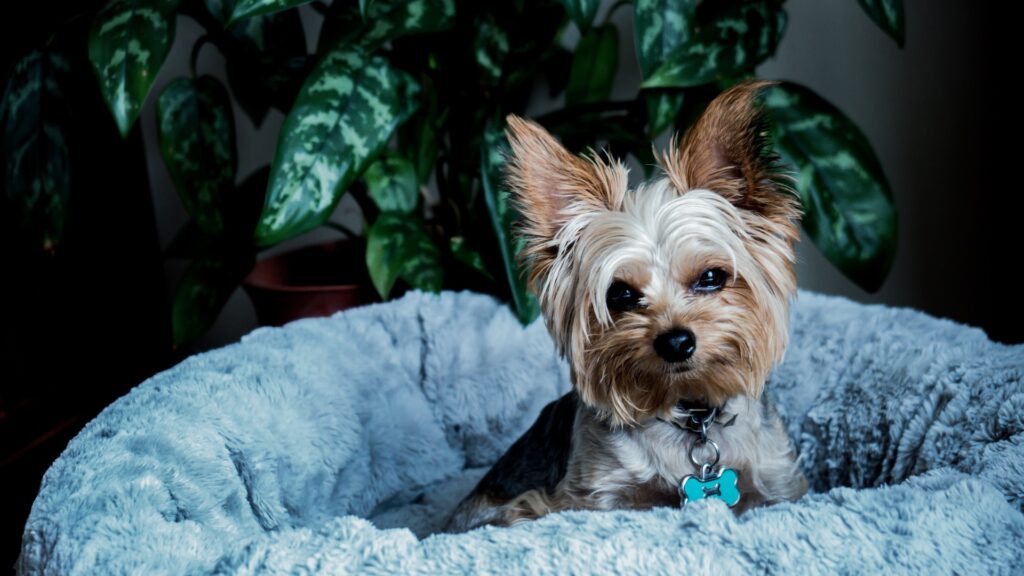The Siberian Husky is a popular dog known for its big coat that protects again harsh colds. The price to pay for such a coat is excessive shedding. But people wonder if a hypoallergenic Husky exists.
No, there is no such Husky that doesn’t shed. Hence why this breed is not recommended for allergy sufferers. However, there are ways to decrease shedding in Huskies. There are also some alternatives to Huskies that might interest you.
- What Does Hypoallergenic Mean?
- Do Huskies Shed A Lot Of Fur?
- How To Decrease Husky Shedding
- Hypoallergenic Dogs That Look Like Huskies
What Does Hypoallergenic Mean?
The term “hypoallergenic” was first coined by the cosmetic industry to refer to products that are only “slightly allergic”. Because some products used to cause severe allergic reactions, the “hypoallergenic” products were marketed as better for people that are prone to allergies.
When it comes to dogs, the term “hypoallergenic” refers to some dog breeds that shed less than other dog breeds. This means that that dog will cause less severe allergies to allergy-prone people. But there is no dog breed that is fully hypoallergenic and does not cause any reaction at all.
How To Know If You Are Allergic?
The Asthma and Allergy Foundation of America states that 10%-20% of the world population suffers from pet allergies. The connection between Huskies and allergies comes from the fact that these dogs produce a lot of dander and saliva.
This dander comes into contact with the owner causing an immune response that can vary from slight to severe. The result is symptoms that can include:
- Stuffy and runny nose
- Sneezing and coughing
- Redness and itching of the eyes
- Hives
- Breathing problems
In people with asthma, allergens can cause an asthma attack. If you have any of these symptoms when you are around dogs, you might be allergic.
Do Huskies Shed A Lot Of Fur?
Siberian Huskies are a dog breed that is considered to be high-shedding. This is due to their large double coats designed to keep them warm in the harsh colds of Siberia. Twice a year, the shedding will increase to even higher levels.
Are Siberian Huskies Hypoallergenic?
These sled dogs have a medium-length double coat. This double coat consists of a thick undercoat meant to retain heat and a top coat that protects the skin. Because of their coats, Huskies can withstand cold weather, but they can also survive in warmer regions.
These dogs shed year-round. The shedding of their coat increases during the “coat-blowing” season. This happens twice a year, once in spring and once in autumn, and it is meant to adapt the coat to the outside temperature. Because of their coat Huskies cause allergies and are not considered to be hypoallergenic dog breeds.
How To Decrease Husky Shedding
Husky owners, even if not prone to allergies, will still have problems cleaning after the shed fur. But there are ways to decrease the shedding.
Groom Properly
The Husky coat needs to be brushed at least once a week to prevent excessive shedding. It also helps prevent mats and tangles from forming. This should be increased during “coat blowing” season.
Regular bathing is also needed. Once a month would be enough to keep the coat clean and to avoid overbathing. Make sure to use a shampoo that is meant for dogs. There are special de-shedding shampoos that are perfect for decreasing shedding. There are also shampoos made specifically for some dogs, like the one for the wire haired Jack Russell.
Some people think that shaving the Husky coat will help with shedding, but this is not true. In fact, shaving the Husky will ruin its double coat and only lead to more shedding and problems.
Healthy Food And Supplements
Are Siberian Huskies hypoallergenic? No, but with the right nutrition, their shedding can be managed. A balanced diet should include a lot of protein and fewer carbs. Vitamins, minerals, and antioxidants are also really important. For a healthy coat, vitamin E and omega-3 fatty acids should be introduced as a part of the diet. Foods like salmon and other fish are full of these ingredients.
If you think that you don’t include enough essential ingredients in the dog’s diet, you can also use supplements. Fish oil supplements are perfect for maintaining a healthy skin and coat. Water is also important as dehydration can cause excessive shedding.
Exercise Regularly
Because they are considered to be high-energy dogs, Huskies need to be exercised well. On average, a Husky will need around 2 hours of exercise daily. This should be split into more sessions during the day.
This will help reduce shedding in two ways. The direct way is by letting the dog shed its hair outside, therefore, decreasing the amount of hair in the home. The indirect way is by improving its health which will lead to healthier skin and coat that shed less. Some health conditions like skin allergies and parasites might increase the shedding, so regular vet checkups are also important.
Keep The Husky In A Separate Room
Huskies are bad for allergies and should be kept in a room away from people that are prone to allergies. They should especially be kept away from the bedroom to keep the bed clean. If the allergens stick to the bedding, you will be more exposed to them with the danger of developing allergies for yourself. The huge amounts of hair on the bedding will also require constant washing.
You should train the Husky to stay in a separate room. Getting it a dog crate and spending some time for crate training will help. Keeping the Husky outside is also a viable option if you have a big enough yard.
Establish Measures To Reduce Symptoms
Even though you can be allergic to a Husky, you can still establish some preventative measures. One thing is to keep your home as clean as possible. Vacuuming, dusting, sweeping, and wiping the counters are activities you should commit to regularly. You can put a mask on to prevent breathing in the allergens.
Use a HEPA filter that helps purify the air of all allergens. Cover the AC filters in your bedroom to prevent them from spreading allergens throughout the house. Buy a robot vacuum that will automatically clean your home. For severe allergies, try immunotherapy to help your immune system.
Hypoallergenic Dogs That Look Like Huskies
If you like the Husky but don’t want to deal with the shedding, there are similar dogs that are known for their hypoallergenic properties.
Standard Poodle
One common dog breed that people recommend as hypoallergenic is the Poodle. This dog has such a good coat that many breeders use it to create mixes with other breeds to make them hypoallergenic.
It is an intelligent breed that is great for everyone and fits well in any family. As a medium to large sized dog, it can fit in any apartment and won’t make it as dirty as Huskies do. It is also known for its gorgeous hair.
The Siberpoo, a Poodle Husky mix is hypoallergenic and might be a good idea for owners prone to allergies.
Samoyed
Comparing the Husky and the Samoyed is not easy, as both dogs come from the same place. The harsh cold winters of Siberia made it possible to create two very fluffy dog breeds with a positive attitude. But, compared to the highly shedding Husky, the fluffy Samoyed is not known to shed as much.
Samoyeds come in only one color compared to Huskies. They are friendly but are also great guard dogs. They need as much exercise and training as Huskies and are intelligent but also quite stubborn. All in all, Samoyeds are a great substitution for the beloved Husky.
Portuguese Water Dog
Another dog breed known for its hypoallergenic properties is the Portuguese Water Dog. This dog has origins from a lot of centuries ago and is believed to be related to the Poodle.
This medium-sized dog was originally used to retrieve fish for the Portuguese fisherman so it developed a long curly waterproof coat.
Besides being hypoallergenic, this dog is known for its affectionate and friendly behavior. It is a high-energy dog that wants to play and goof around for the whole day. It is intelligent and eager to please so training will not be hard. Overall, this is a great substitution for Husky.
Husky Mixes
If you are adamant about getting a Husky, but can’t deal with the shedding, try getting a hypoallergenic Husky mix. Some hypoallergenic Husky mixes include the Huskita, Dalusky, Goberian, and Siberian Pinscher.
These mixes were created with the idea of having a dog with similar traits to the Husky, but with the advantage of not shedding as much. Overall, the result of mixing a Husky with another animal results in a middle-sized dog with a fun personality.
The Husky mixes are affectionate and playful with a high energy level. They are intelligent and friendly and can fit in any family. A great option for Husky lovers.

Does A Hypoallergenic Husky Exist? – A Summary
The Siberian Husky is an amazing dog. It is friendly, affectionate, and loves to play with its family. But one big problem is that it is a high-shedding dog. Due to this shedding, people prone to allergies are not able to have a Husky as a pet.
There are ways to reduce the shedding of the Husky. Proper nutrition, supplements, and exercise will help keep its skin and coat healthy and low in shedding. Regular grooming and cleaning of the home will decrease the dander and hairs that are all around the house.
If you like the Husky, but can consider getting a similar dog, there are a few options you can choose. The Poodle, Samoyed, and the Portuguese Water Dog, are all amazing dogs that are known for being hypoallergenic. Another option is to get a hypoallergenic Husky mix.
FAQ
How long do pet allergy symptoms last?
Symptoms of a pet allergy can last for a few hours after contact with the allergens. If you have a pet at home, you might experience allergy symptoms until the pet is completely removed from the home.
Can my pet allergy be completely stopped?
People that are prone to allergies will never cure them completely. Getting a hypoallergenic Husky alternative won’t help much in the long run. Luckily, there is some medication that relieves the symptoms.
Can a person die from pet allergies?
Generally, pet allergies don’t cause life-threatening symptoms. However, some people that are very sensitive to pet allergens might experience an anaphylactic shock or a bad asthma attack. Those conditions need treatment from a medical professional.
Do Pitbulls and Huskies Get Along? Exploring Compatibility
Some folks are huge dog lovers and end up having multiple furry friends in their…
The Blue Heeler Husky Mix: A Remarkably Hardworking Dog
Blue Heelers, or Australian Cattle Dogs, and Siberian Huskies are two dogs known for their…
Plush Coat Husky vs Standard – Can You Compare Them?
Siberian Huskies are known for their beautiful fluffy coat. Usually, Huskies are born with a…
8 Fascinating Husky Mixes That Don’t Shed A Lot
Huskies are fluffy, friendly, and loving dogs. One drawback of Huskies is their profuse and…
The Simple Husky Vs Samoyed Guide: How Do They Compare?
Huskies and Samoyeds are two breeds with similar origins. Both come from the northern parts…
The Yorkie And Husky Mix – An Unexpected But Fascinating Dog
Yorkshire Terriers and Siberian Huskies are both great dogs with very desirable traits. But they…







